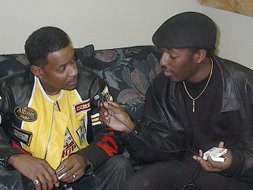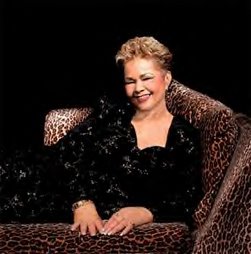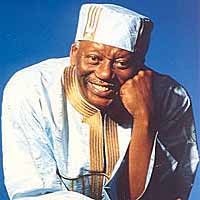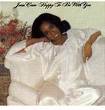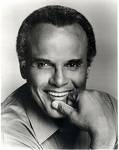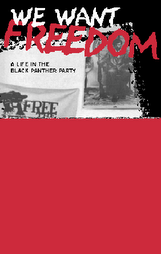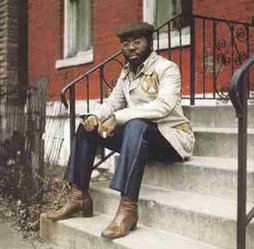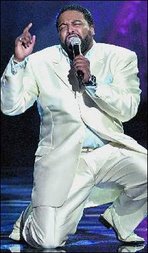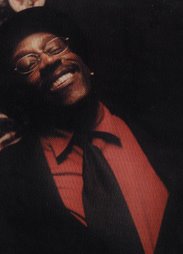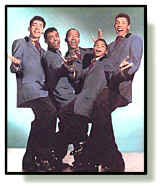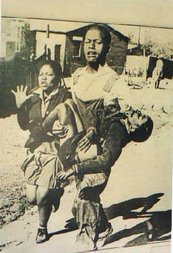By Norman (Otis) Richmond
When Richard Barrett passed in New York City recently there was little or no mentioned of him on urban radio. Who was Richard Barrett you might ask? If you live in Toronto and watch television you’ve more than likely heard the Three Degrees performing When Will I See You Again on a popular television commercial.
The original lead singer of The Valentines, Barrett was among the most creative and talented individuals of the era, and was instrumental in the careers of the many talented artists that were signed to George Goldner's plethora of successful labels including the Chantels, Dubs, Teenagers, Little Anthony and the Imperials, the Flamingos, Cleftones, and others.
He served as a producer, A&R director, manager, and successful songwriter well into the 1970s, working with artists including Harold Melvin and the Blue Notes and the Three Degrees. He was one of the first successful independent black record producers and also became a pioneering black producer on Broadway. Barrett died of prostate cancer at age 70. He passed away peacefully with his family by his bedside.
Many of the hip-hop generation will remember Ben Vereen playing Barrett in the film Why Do Fools Fall in Love. The film starred Halle Berry, Vivica A. Fox, Lela Rochon, and Lorenz Tate. Barrett was portrayed by Tate who discovered Frankie Lymon.
A New York City daily lamented the fact that Barrett was not properly respected by urban radio in the big apple when he passed. David Hinckley pointed out, “When he died last Thursday, there was hardly a place on commercial New York radio that would play him at all – even though he helped give us records as important as the Teenagers’ Why Do Fools Fall In Love, the Chantels’ Maybe and the Three Degrees’ TSOP and When Will I See You Again.
“Few of these artists, of course, mean much to a 14 –year-old today. Or a 34 –year-old. Which is why commercial New York radio rarely plays them.
“A few years ago, Barrett’s death would have meant a salute on (Former WCBS-FM) Bobby Jay’s or Bob Shannon’s WCBS-FM show that night.”
“In 2006 that salute has moved. Matt the Cat on XM Satellite Radio dedicated Friday’s show to Barrett, assembled a strong tribute and closed it out with the Valentines ‘“Don’t Say Goodbye.”
This writer did a small tribute to Barrett on CKLN-FM 88.1’s Saturday Morning Live by discussing Barrett illustrious career with professor/author Gerald Horne and playing music by Frankie Lymon and the Teenagers, the Chantels, Little Anthony and the Imperials and the Three Degrees. Hopefully, Fitzroy Gordon’s new radio station can fill this vacuum. Clinton Morgan’s Eagle Force Entertainment brought in the Original Manhattans (featuring Blue Lovett and Gerald Alston), Melba Moore(who where backed by the Jay Douglas All-Star Band), Dobby Dobson, Jimmy Reid, Winston Hewitt, Lady Jade and Mr. Cooper have proven the market for Black music is still strong in this city.
Saturday, November 25, 2006
No Ray of hope:The Genius of Soul allowed wine, women and song to cloud his political judgment
BY NORMAN (OTIS) RICHMOND
When Ray Charles first performed in Paris in the 60s, the Algerians sent him a message that he was safe despite the fact that they were fighting a war against French colonialism.
It's the kind of ambiguous tale that looms large in the legacy of the brilliant genre-bending artist who died last June, just missing the buzz over Ray, the recently released flick starring Jamie Foxx.
Charles may have been a musical and business genius, but on the political front it's an altogether different matter. He liked to get paid and laid – and I'm afraid he allowed this aspect of his personality to cloud his political judgment.
His best-known transgression was performing in South Africa when the United Nations-sanctioned cultural boycott was in full effect – a boycott supported by the African National Congress and all the liberation movements.
When Charles played there in 1981, the Black Consciousness Movement (of Azania) made it clear that they loved him but that this was not the time to appear in that racist state. The appeal didn't faze him, and as a result he faced pickets in South Africa and 15 cities in North America, including Toronto, Albany, New York City and Los Angeles.
All that the UN asked for was a simple apology and a pledge not to return to South Africa until apartheid was abolished. But Charles wouldn't utter the "sorry'' word and instead told his detractors that they could "kindly kiss the far end" of his anatomy.
Other stars got it right: Curtis Mayfield, Frank Sinatra, Tina Turner, George Benson, Eartha Kitt, Jimmy Cliff and many others. Even Sammy Davis Jr., a card-carrying Republican, appealed to then president Ronald Reagan, one of the pariah state's greatest supporters, to reverse his position.
Charles described himself as a Hubert Humphrey Democrat, meaning a left-moderate Democrat in the parlance of the times. But when he was offered $100,000 to perform America The Beautiful at Reagan's second inaugural gala in 1985, he softened his stance on the Republicans. He had recorded a version of this patriotic song back in 1972, in the days when black activists were hostile to the symbols of American nationhood and on principle wouldn't stand up at public events when the national anthem was played.
At Reagan's celebration, Charles sang and played piano to a taped orchestral background, without a band, and he and long-time manager Joe Adams pocketed all the money. Adams was proud of the contract. When he met with Ron Wilkins of the Unity and Action Network (Los Angeles chapter) and actor Robert Hooks on the issue, Adams boasted that "for that kind of money we would have sung America The Beautiful at a Ku Klux Klan rally."
I always blamed Adams for turning the race-conscious Charles into a puddle for the Republican party. Adams had been an L.A. radio personality, entrepreneur and actor who starred in many Hollywood films, including Carmen Jones, with Lena Horne, and the original Manchurian Candidate, in which he played Frank Sinatra's psychiatrist. He managed Charles at a time when African-American artists were almost exclusively handled by Euro-Americans. So Charles made a brave choice in hiring Adams.
Still, I've come to believe over time that most of the political gaffes belonged to Charles himself. There's no other way to understand his chronic insensitivity to the dreams and desires of black America. In the end – sadly – it appears that the "Genius of Soul" was unfailingly his own man.
When Ray Charles first performed in Paris in the 60s, the Algerians sent him a message that he was safe despite the fact that they were fighting a war against French colonialism.
It's the kind of ambiguous tale that looms large in the legacy of the brilliant genre-bending artist who died last June, just missing the buzz over Ray, the recently released flick starring Jamie Foxx.
Charles may have been a musical and business genius, but on the political front it's an altogether different matter. He liked to get paid and laid – and I'm afraid he allowed this aspect of his personality to cloud his political judgment.
His best-known transgression was performing in South Africa when the United Nations-sanctioned cultural boycott was in full effect – a boycott supported by the African National Congress and all the liberation movements.
When Charles played there in 1981, the Black Consciousness Movement (of Azania) made it clear that they loved him but that this was not the time to appear in that racist state. The appeal didn't faze him, and as a result he faced pickets in South Africa and 15 cities in North America, including Toronto, Albany, New York City and Los Angeles.
All that the UN asked for was a simple apology and a pledge not to return to South Africa until apartheid was abolished. But Charles wouldn't utter the "sorry'' word and instead told his detractors that they could "kindly kiss the far end" of his anatomy.
Other stars got it right: Curtis Mayfield, Frank Sinatra, Tina Turner, George Benson, Eartha Kitt, Jimmy Cliff and many others. Even Sammy Davis Jr., a card-carrying Republican, appealed to then president Ronald Reagan, one of the pariah state's greatest supporters, to reverse his position.
Charles described himself as a Hubert Humphrey Democrat, meaning a left-moderate Democrat in the parlance of the times. But when he was offered $100,000 to perform America The Beautiful at Reagan's second inaugural gala in 1985, he softened his stance on the Republicans. He had recorded a version of this patriotic song back in 1972, in the days when black activists were hostile to the symbols of American nationhood and on principle wouldn't stand up at public events when the national anthem was played.
At Reagan's celebration, Charles sang and played piano to a taped orchestral background, without a band, and he and long-time manager Joe Adams pocketed all the money. Adams was proud of the contract. When he met with Ron Wilkins of the Unity and Action Network (Los Angeles chapter) and actor Robert Hooks on the issue, Adams boasted that "for that kind of money we would have sung America The Beautiful at a Ku Klux Klan rally."
I always blamed Adams for turning the race-conscious Charles into a puddle for the Republican party. Adams had been an L.A. radio personality, entrepreneur and actor who starred in many Hollywood films, including Carmen Jones, with Lena Horne, and the original Manchurian Candidate, in which he played Frank Sinatra's psychiatrist. He managed Charles at a time when African-American artists were almost exclusively handled by Euro-Americans. So Charles made a brave choice in hiring Adams.
Still, I've come to believe over time that most of the political gaffes belonged to Charles himself. There's no other way to understand his chronic insensitivity to the dreams and desires of black America. In the end – sadly – it appears that the "Genius of Soul" was unfailingly his own man.
Subscribe to:
Posts (Atom)

